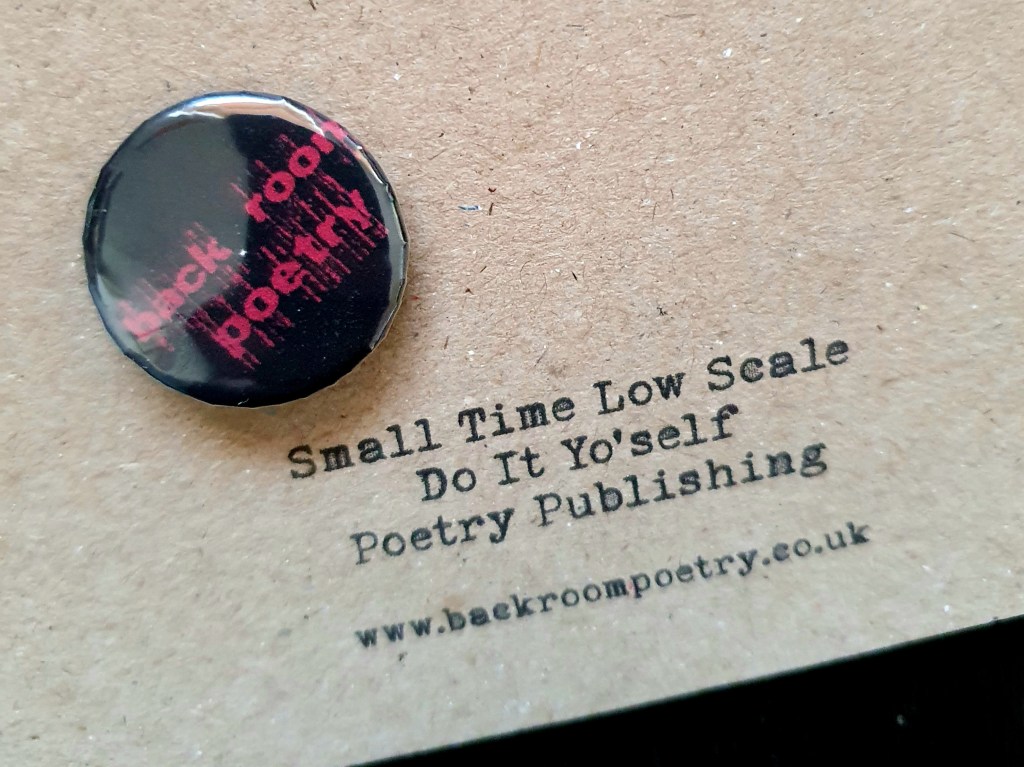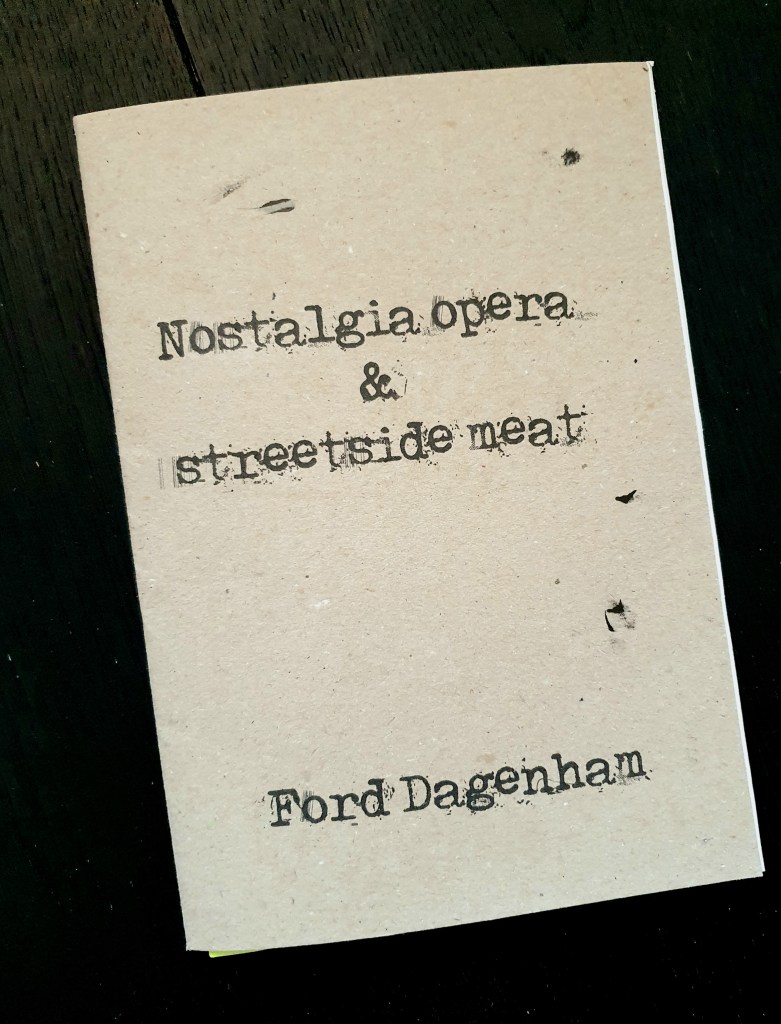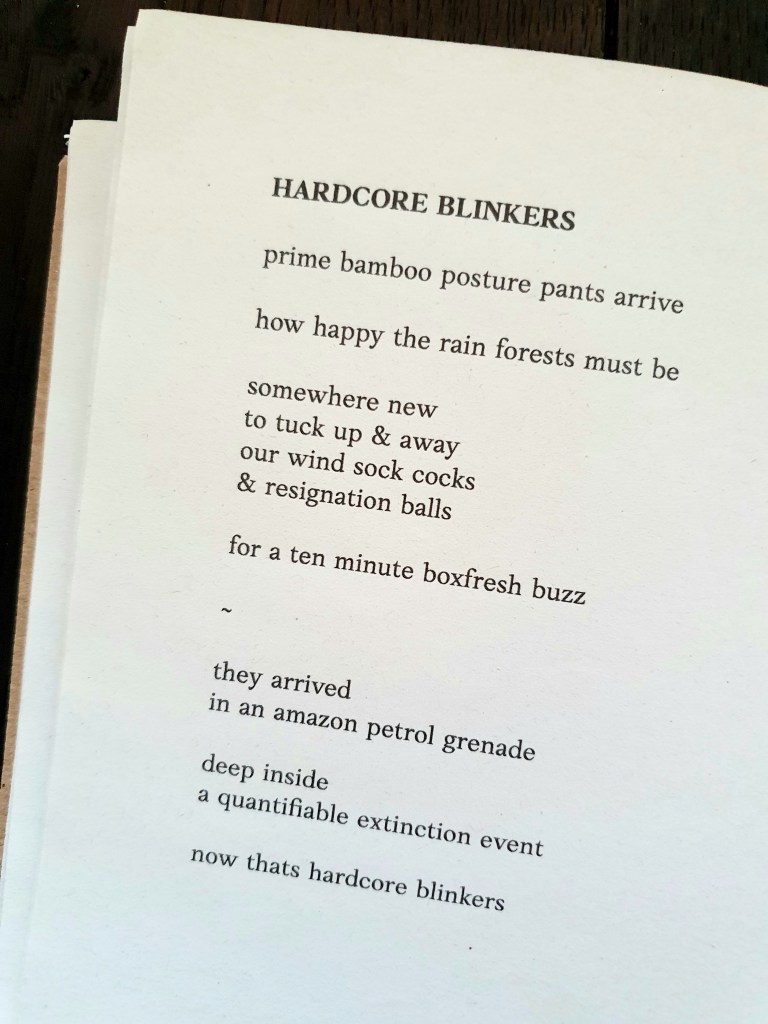How’s your poetry social media looking? Overflowing with prizes and pamphlets? The birdsong and death rattle of submissions windows opening and closing? A landfill of small successes and failures? A rising ocean of ennui and angst? No? Just me?
As a previous post suggests, it all gets a bit intense and overhyped sometimes. But sometimes something comes along that reminds you why you liked poetry in the first place. It cuts to the chase, goes back to the source (etc etc) to re-connect with the poetic impulse of getting words down that might mean something to some people, or that might connect ideas and language and images in a refreshing, revealing way, with none of the often-associated hand-wringing bullshit.
Poetry people, I present Ford Dagenham‘s Nostalgia Opera & Streetside Meat, the first pamphlet published from East Sussex based Back Room Poetry.
Let’s cut to that aforementioned chase.
Back Room Press is an outfit that describes itself as ‘Small Time Low Scale Do It Yo’self Poetry Publishing’. The pamphlet has a limited run of 50 and arrives assuredly DIY, a little rough and ready, inky and stapled. Hand-built. Tactile. Much more engaging than yer average overly cleansed bright-white interior POD affair. It’s something that makes you think Back Room might have an agenda – maybe even a manifesto.
Then there’s the author, who I know nothing about other than that their name also makes me feel they might have an agenda, or an idea of what’s what and what could be. The intriguing titles of the poems back this up: ‘Timeless Downer Ground’; ‘Tho My Mug is Broken’; ‘Daylight Cropped by the Yellow Half-Nets’. Something’s going on here. It’s confident, knowing, self-aware, maybe slightly adversarial and potentially piss-taking – all in a good way.
The opener ‘Where Houses Later Would Be, A Childhood Pop’, is one of a few ‘Pop’-titled poems. What are these ‘pops’? They feel like fizzing pops of thought and experience. So far so usual, maybe. But there are real rock ‘n’ roll pops in each of these everyday realities. Air bubbles. Ways to breathe, to catch breath, or to pop the balloon, the safety of the hype bubble and middle-class security. Or little teardrops exploding. Or like fizz, the fizz of pop and pop culture.
Another title is ‘Nostalgia Dead Ended for the Stasis Meat’. What’s happening with time here? Lots of things. And also lots of things with the way we feel and hold onto experience too. And so…
. . . nostalgia
smells of when I smelt that smell
from the hall outlet
another time
before
We are heading towards a simulacrum of experience. Experience designed and delivered by production line (hello Ford factory), over and over until…. until what? Breakdown. Disjuncture. Erasure. Nothingness.
SCREEN BURN FADING
can’t recall all of this poem –
i was napping
& its screen burn faded
into dreams
of victorian era
whisky heists
but it ended like this –
or
LIKE I LEFT THE ENGINE RUNNING
the myth of the muse
is a side effect
of all of the saliva we swallow
Many of these poems are 12-15 liners. They don’t all employ the alliteration of the extract above, but the sounds of the poems, their cadences, are often easygoing. But these are also the lulls that the author snaps us out of, with ‘scrub & backfill / round its unfinished edges’, or a ‘siren panic to your maintenance dread ‘ or a ‘now that’s hardcore blinkers’.
Ease is the nostalgia trip – maybe the opera vs the streetside meat. Somewhere in all this are the many soft but major hypocrisies of contemporary living, and the sense that they have increased and are still increasing with human life’s multiplying burden on the world. And all while something is being lost…
&
the
repeating repeating repeating
pop & rock songs in my headpan
they recede recede & leave
A headpan. not headphones. A tool of sorts to aid construction or discovery. But not the direct line between broadcast and audience, speak and listener. Something more rudimentary and elemental maybe. Something that needs our work.
I like this little pamphlet. And I like DIY presses making outsized impressions. Don’t let them recede and leave.


